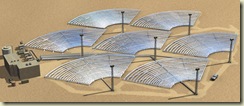If solar power has an image problem, it is that there is an aura of fluffy-headed idealism about it, a wouldn't-it-be-cool do-good factor that bull sessions in college are built around but not grown-up things like energy policy.
there is an aura of fluffy-headed idealism about it, a wouldn't-it-be-cool do-good factor that bull sessions in college are built around but not grown-up things like energy policy.
So it is a puzzlement whether the recent announcement by eSolar portends an interesting development or the kind of thing that wows the kids at liberal arts schools. (The name eSolar doesn't help a bit - sounds like software to help you get a great tan through your computer.)
Here's the announcement:
Google, Idealab and Oak Investment Partners, among others, are backing Pasadena's eSolar with investments worth $130 million.
eSolar plans to use computing and mass manufacturing technology to build thermal solar plants more cheaply and efficiently.
"The eSolar power plant is based on mass manufactured components, and designed for rapid construction, uniform modularity, and unlimited scalability," Asif Ansari, CEO of eSolar, said in a press release.
And here is Board Chairman Bill Gross:
Bill Gross, the Internet entrepreneur who founded Idealab and is chairman of eSolar, said in the release that eSolar's goals mesh perfectly with those goals.
"eSolar's primary business goal is nothing short of making solar electricity for less than the price of coal, without subsidies," he said. "This is not only attainable, but will truly change the world."
That world-changing bit is a real clanger, but points for ambition.
Here is ePower's description of how easy it is to install their panels:
eSolar has designed a solar field layout that minimizes installation time and cost. By employing a repeating frame structure and a revolutionary calibration system, eSolar has eliminated the need for high-precision surveying, delicate installation, and individual alignment of mirrors. Minimal skilled labor is needed to build the solar field, allowing for mirror deployment efficiencies that scale with project size and deadlines. From permitting to construction, plants come on line quickly, and that means more power to satisfy renewable portfolio goals.
What eSolar seems to lack right now is a customer, so presumably, they're still ramping up the technology. We wish them well - we really do, as the idea of easily expandable energy plants certainly seems consistent with what one ought to be able to do with solar panels - but nothing about all this dispels the aroma of dreamy people doing dreamy things. And that's a problem when you want to be taken seriously.
But by all means, explore their site and see what you think.
Comments
That plant though, it looks pretty small...
This pretty well comes down to the control mechanisms they're building. I don't see how automation is going to fix the costs of the mechanical motors. In order for this to mean anything, they're got to have something up their sleeve that's most definitely not available in the information out there.
They might.